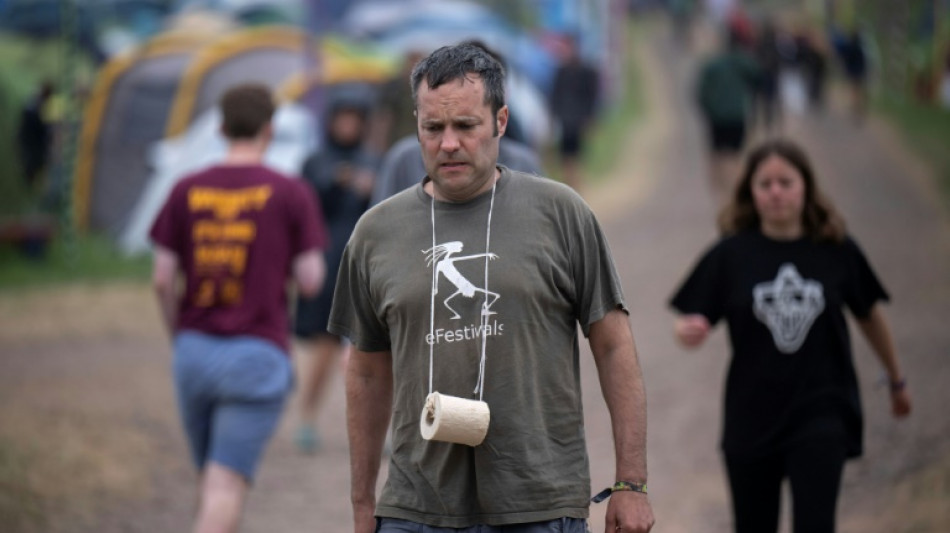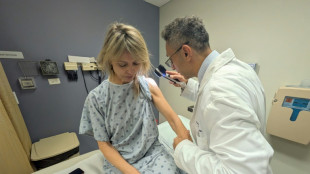
-
 North Korea acknowledges its troops cleared mines for Russia
North Korea acknowledges its troops cleared mines for Russia
-
US unseals warrant for tanker seized off Venezuelan coast

-
 Cambodia says Thailand still bombing hours after Trump truce call
Cambodia says Thailand still bombing hours after Trump truce call
-
Machado urges pressure so Maduro understands 'he has to go'

-
 Leinster stutter before beating Leicester in Champions Cup
Leinster stutter before beating Leicester in Champions Cup
-
World stocks mostly slide, consolidating Fed-fuelled gains

-
 Crypto firm Tether bids for Juventus, is quickly rebuffed
Crypto firm Tether bids for Juventus, is quickly rebuffed
-
Union sink second-placed Leipzig to climb in Bundesliga

-
 US Treasury lifts sanctions on Brazil Supreme Court justice
US Treasury lifts sanctions on Brazil Supreme Court justice
-
UK king shares 'good news' that cancer treatment will be reduced in 2026

-
 Wembanyama expected to return for Spurs in NBA Cup clash with Thunder
Wembanyama expected to return for Spurs in NBA Cup clash with Thunder
-
Five takeaways from Luigi Mangione evidence hearings

-
 UK's king shares 'good news' that cancer treatment will be reduced in 2026
UK's king shares 'good news' that cancer treatment will be reduced in 2026
-
Steelers' Watt undergoes surgery to repair collapsed lung

-
 Iran detains Nobel-prize winner in 'brutal' arrest
Iran detains Nobel-prize winner in 'brutal' arrest
-
NBA Cup goes from 'outside the box' idea to smash hit

-
 UK health service battles 'super flu' outbreak
UK health service battles 'super flu' outbreak
-
Can Venezuela survive US targeting its oil tankers?

-
 Democrats release new cache of Epstein photos
Democrats release new cache of Epstein photos
-
Colombia's ELN guerrillas place communities in lockdown citing Trump 'intervention' threats

-
 'Don't use them': Tanning beds triple skin cancer risk, study finds
'Don't use them': Tanning beds triple skin cancer risk, study finds
-
Nancy aims to restore Celtic faith with Scottish League Cup final win

-
 Argentina fly-half Albornoz signs for Toulon until 2030
Argentina fly-half Albornoz signs for Toulon until 2030
-
Trump says Thailand, Cambodia have agreed to stop border clashes

-
 Salah in Liverpool squad for Brighton after Slot talks - reports
Salah in Liverpool squad for Brighton after Slot talks - reports
-
Marseille coach tips Greenwood as 'potential Ballon d'Or'

-
 Draw marks 'starting gun' toward 2026 World Cup, Vancouver says
Draw marks 'starting gun' toward 2026 World Cup, Vancouver says
-
Thai PM says asked Trump to press Cambodia on border truce

-
 Salah admired from afar in his Egypt home village as club tensions swirl
Salah admired from afar in his Egypt home village as club tensions swirl
-
World stocks retrench, consolidating Fed-fuelled gains

-
 Brazil left calls protests over bid to cut Bolsonaro jail time
Brazil left calls protests over bid to cut Bolsonaro jail time
-
Trump attack on Europe migration 'disaster' masks toughening policies

-
 US plan sees Ukraine joining EU in 2027, official tells AFP
US plan sees Ukraine joining EU in 2027, official tells AFP
-
'Chilling effect': Israel reforms raise press freedom fears

-
 Iran frees child bride sentenced to death over husband's killing: activists
Iran frees child bride sentenced to death over husband's killing: activists
-
No doubting Man City boss Guardiola's passion says Toure

-
 Youthful La Rochelle name teen captain for Champions Cup match in South Africa
Youthful La Rochelle name teen captain for Champions Cup match in South Africa
-
World stocks consolidate Fed-fuelled gains

-
 British 'Aga saga' author Joanna Trollope dies aged 82
British 'Aga saga' author Joanna Trollope dies aged 82
-
Man Utd sweat on Africa Cup of Nations trio

-
 EU agrees three-euro small parcel tax to tackle China flood
EU agrees three-euro small parcel tax to tackle China flood
-
Taylor Swift breaks down in Eras documentary over Southport attack

-
 Maresca 'relaxed' about Chelsea's rough patch
Maresca 'relaxed' about Chelsea's rough patch
-
France updates net-zero plan, with fossil fuel phaseout

-
 Nowhere to pray as logs choke flood-hit Indonesian mosque
Nowhere to pray as logs choke flood-hit Indonesian mosque
-
In Pakistan, 'Eternal Love' has no place on YouTube

-
 England bowling great Anderson named as Lancashire captain
England bowling great Anderson named as Lancashire captain
-
UK's King Charles to give personal TV message about cancer 'journey'

-
 Fit-again Jesus can be Arsenal's number one striker, says Arteta
Fit-again Jesus can be Arsenal's number one striker, says Arteta
-
Spain's ruling Socialists face sex scandal fallout among women voters


One or two bowel movements a day keeps the doc away: study
Everybody poops sometimes, but does it really matter how often?
A new study published Tuesday in Cell Reports Medicine reveals that bowel movement frequency significantly influences physiology and long-term health, with the best outcomes linked with passing stools once or twice a day.
Previous research has suggested associations between constipation and diarrhea with higher risks of infections and neurodegenerative conditions, respectively.
But since these findings were observed in sick patients, it remained unclear whether irregular bathroom visits were the cause or result of their conditions.
"I do hope that this work will kind of open clinicians' minds a bit to the potential risks of not managing bowel movement frequencies," senior author Sean Gibbons at the Institute for Systems Biology told AFP, explaining that doctors often view irregular movements as merely a "nuisance."
Gibbons and his team collected clinical, lifestyle, and biological data -- including blood chemistry, gut microbiome, genetics and more -- from over 1,400 healthy adult volunteers with no signs of active disease.
Participants' self-reported bowel movement frequencies were categorized into four groups: constipation (one or two bowel movements per week), low-normal (three to six per week), high-normal (one to three per day), and diarrhea.
When stools linger too long in the gut, microbes exhaust the available fiber -- which they ferment into beneficial short-chain fatty acids -- and instead ferment proteins, producing toxins like p-cresol sulfate and indoxyl sulfate.
"What we found is that even in healthy people who are constipated, there is a rise in these toxins in the bloodstream," said Gibbons, noting that these toxins are particularly burdensome to the kidneys.
- Fruits and vegetables key -
In cases of diarrhea, the team found clinical chemistries indicative of inflammation and liver damage. Gibbons explained that during diarrhea, the body excretes excessive bile acid, which the liver would otherwise recycle to dissolve and absorb dietary fats.
Fiber-fermenting gut bacteria known as "strict anaerobes," associated with good health thrived in the "Goldilocks zone" of one or two poops a day. However, Gibbons emphasized that more research is needed to define this optimal range more precisely.
Demographically, younger people, women, and those with a lower body mass index tended to have less frequent bowel movements.
Hormonal and neurological differences between men and women may explain the gap, Gibbons said, along with the fact that men generally consume more food.
Finally, by pairing biological data with lifestyle questionnaires, the team painted a clear picture of those who typically fall into the Goldilocks Zone.
"It was eating more fruit and vegetables, that was the biggest signal we saw," said Gibbons, along with drinking plenty of water, regular physical activity, and eating a more plant-dominant diet.
The next step in the research could involve designing a clinical trial to manage the bowel movements of a large group of people, followed over an extended period to assess its potential in disease prevention.
O.Karlsson--AMWN
